#810 Pawns in the Hitler Youth
Secrets in the Shadows
by Heige S. Boehm
Vancouver: Ronsdale Press, 2019
$14.95 / 9781553805724
Reviewed by Valerie Green
*
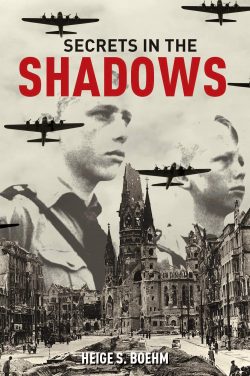 Secrets in The Shadows is the story of two boyhood friends, Michael and Wolfgang (Wolfie), growing up in Nazi Germany in the 1930s. But it is also so much more.
Secrets in The Shadows is the story of two boyhood friends, Michael and Wolfgang (Wolfie), growing up in Nazi Germany in the 1930s. But it is also so much more.
Author Heige S. Boehm has brilliantly captured the atmosphere and spirit in Germany of the years leading up to WWII in her book Secrets in the Shadows as she takes the reader on a journey during the time when German youth were brainwashed into believing that Adolph Hitler would make Germany the most powerful country in the world — at any cost.
Boehm explains at the end of her book that she wrote this story because of her “need to understand how (her) father became the complex man he was, a man who was a product of the Nazi era with all its damaging influences, beliefs, and effects.” Her own father was born in Germany in 1933, the year Hitler rose to power, and he was twelve when Word War II ended.
With meticulous research, Boehm places her two fictional boys, Michael and Wolfie, into that same era — when anti-Semitism gradually became the norm. Sadly, children were raised to believe all they were told and, in order to create a so-called “pure superior race” in Germany, Jews must be obliterated.
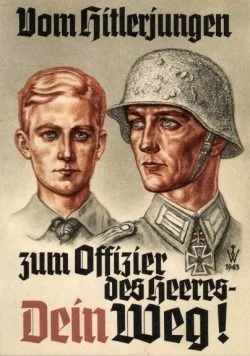
The story is captivating from the very first page, showing how these two innocent children grow up believing all they are told, and if and when war comes they will willingly join up and be proud soldiers fighting for the honour of their Fuhrer.
Michael is the son of an SS officer who has instilled these beliefs into his children. Michael also has a loving mother and many siblings.
Wolfie is the only child of a single, alcoholic mother and spends most of his time with Michael’s family.
Their youthful adventures together are both charming and poignant. We get to see these boys experiencing life while being introduced to other characters such as Michael’s two older twin brothers (Peter and Kurt who are at an academy training to be SS officers like their father), his sisters, Paula, Susi and Annalisa, and his brother Gunther. Gunther stuttered and was slightly handicapped so was considered to be “impure” and not part of the true Aryan race.
At the beginning of the book we learn how those children who are considered “less than perfect” are discriminated against. At school, Michael is tested and learns he is perfect whereas his brother Gunther is not. Although their mother fights to keep Gunther safe and from being sent away to a camp, she knows this will inevitably happen so she has him secretly taken to a neighbouring farm where he will be looked after.
This is the first indication of Michael’s mother’s resistance to what is happening in Germany but she gets no support from her SS husband who believes all that Adolph Hitler, his Fuhrer, preaches. Even when his daughter Paula is raped and becomes pregnant, he thinks of it as a blessing that she will be producing another pure Nazi child for their country.
Michael and Wolfie, however, slowly realize that something is wrong. They were the ones who came upon the rape incident and saved Paula from further abuse. But during the rescue, a death occurs which they never speak of again.
Later the whole family travels to Berlin to join the celebrations for Hitler’s 50th birthday and Michael is mesmerized by the Fuhrer’s charisma despite some earlier doubts. But later when the two boys are sent by train to a training camp for Hitler’s youth, Michael witnesses the shooting of a young Jewish girl and her mother, which has a profound effect on him.
But the real tragedy of Boehm’s story comes when the two boys finally are sent off to war, aged sixteen. These child soldiers witness scenes that no human being should ever see. The author describes these scenes of battles, killings, and massacres of human beings in explicit detail. Michael, who is telling the story throughout, soon comes to realize that there is no glory in war. Enemy and ally are suffering equally and it is all completely senseless. He has turned from a child into a heart-broken young man.
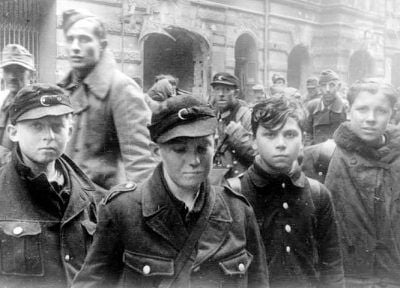
In February of 1945, the story reaches its climax during the final days of the push to create a glorious German victory. Michael and Wolfie are redeployed to Hungary where they will be fighting the Russians rather than the British, Canadian, or American soldiers. Michael is still haunted by visions of his fellow fighters alongside injured enemy soldiers lying on the battlefields begging for help to put them out of their misery. “All I could do was to shoot them dead. I had become the grim reaper’s servant, his personal foot soldier,” Michael writes.
But now, with the Russians closing in on them, the boys realize the end is near and there will be no glory for Germany. Hungary has been lost and the Russians are pushing them back rather than the other way around. The future looks grim as the war draws to a close.
Then in April of 1945, the two boys are ordered to Berlin and it is there, midst the rubble and desolation of a conquered city and with RAF bombers flying overhead, that Michael and Wolfie are reunited with the demons of their past.
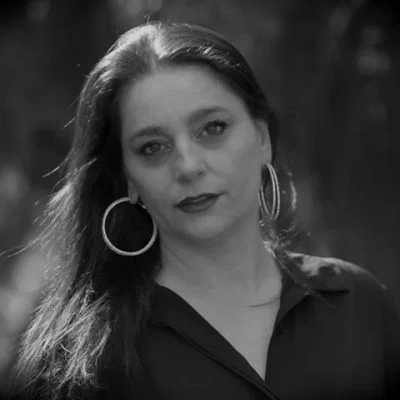
This is a story that I guarantee will haunt the reader long after reaching the last page. Watching these children used as pawns in the games of evil men is heartbreaking, and Boehm’s descriptive text displays this in every line.
The author states she has “one hope for this novel — and that is to inspire a kinder world.” In my humble opinion, she has most definitely achieved this objective.
Heige S. Boehm’s writing is obviously influenced by her own upbringing and stories of her family’s past, but she has combined this with in-depth research of the times about which she writes. At nine years old she and her family emigrated from Germany to Canada.
Boehm holds a Creative Writing certificate from the Writers’ Studio at Simon Fraser University and now lives on the Sunshine Coast of Canada where she is working on her next novel.
*

Valerie Green was born and educated in England where she studied journalism and law. Her passion was always writing from the moment she first held a pen in her hand. After working at the world-famous Foyles Book Store on Charing Cross Road, London, followed by a brief stint with M15 and legal firms, she moved to Canada in 1968, where she married and raised a family, while embarking on a long career as a freelance writer, columnist and author of over twenty non-fiction historical and true-crime books including Above Stairs, Upstarts and Outcasts, If these Walls Could Talk, Vanished: The Michael Dunahee Story, and Dunmora: The Story of a Heritage Manor House on Vancouver Island (Hancock House, 2017 [reviewed by Patrick Dunae in The Ormsby Review no. 434, December 11, 2028 — Ed]. She is currently working on her debut novel Providence, which will be published soon as the first of The McBride Chronicles, an historical four-generational family saga bringing early BC history alive. Now semi-retired (although writers never really retire!) she enjoys taking short road trips around the province with her husband, watching their two beloved grandsons grow up and, of course, writing.
*
The Ormsby Review. More Books. More Reviews. More Often.
Publisher and Editor: Richard Mackie
The Ormsby Review is a journal service for in-depth coverage of B.C. books and authors. The Advisory Board consists of Jean Barman, Robin Fisher, Cole Harris, Wade Davis, Hugh Johnston, Patricia Roy, David Stouck, and Graeme Wynn. Scholarly Patron: SFU Graduate Liberal Studies. Honorary Patron: Yosef Wosk. Provincial Government Patron since September 2018: Creative BC
“Only connect.” – E.M. Forster
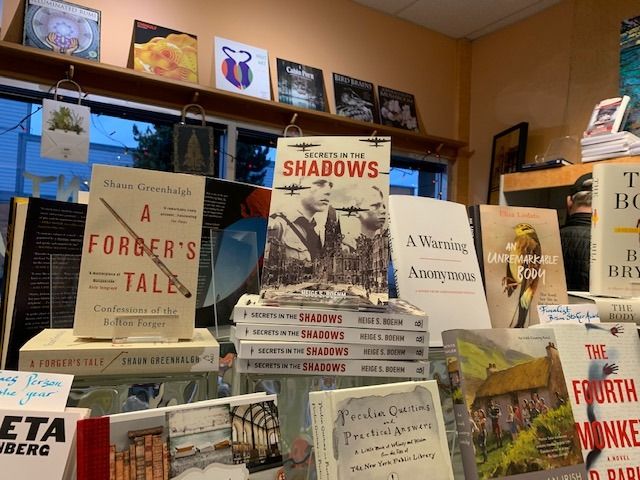































7 comments on “#810 Pawns in the Hitler Youth”
This new book sounds utterly fascinating, and I can’t wait to read it. The subject matter certainly is in my wheelhouse. WWII continues to give up its secrets and reveal its ghosts, and whether through fiction or non-fiction, all are illuminating.